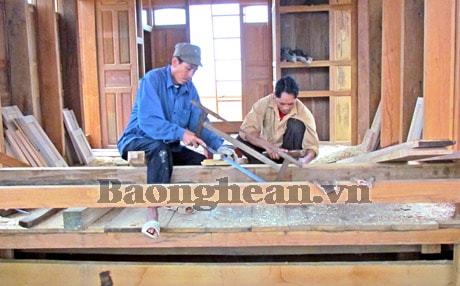Collective economy has difficulty accessing capital
(Baonghean)Implementing Resolution 13/NQ-CP on a number of solutions to remove difficulties for production and business, supporting the market of the Government, the State Bank has also issued a series of open credit policies, lowering interest rates, prioritizing 4 areas, to create conditions for businesses and people to access capital to continue maintaining production. But in reality, many economic sectors still have difficulty accessing loans, especially the collective economic sector in general and cooperatives in particular.
Mr. Nguyen Gia In - Chairman of Trung Kien Shipbuilding Cooperative shared: Trung Kien Shipbuilding Village (Nghi Thiet Commune, Nghi Loc District) builds an average of 65 new ships with a capacity of 30-700 CV each year to serve the market nationwide. The craft village currently has 400 workers, requiring a very large production capital. To build a ship, it requires 50 blocks of wood or more, a large ship requires over 100 blocks of wood, the average price of 1 block of wood at current prices is 10 million VND/block.
The annual capital requirement of the craft village is over 10 billion VND to invest in production and buy raw materials for shipbuilding, but up to now the cooperative has not been able to borrow capital from the bank to serve production because the cooperative does not have land titles to mortgage. If it can borrow land titles from people in the cooperative to mortgage, the value of rural land is very low, not worth anything. The cooperative's shipbuilding contracts are also not valuable as collateral for bank loans. For decades, the cooperative has always had to borrow capital at high interest rates from the people to buy raw materials.

Building wooden ships at Trung Kien Shipbuilding Cooperative.
Mr. Tang Tien Huynh - Chairman of Thang Loi Handicraft Cooperative (Yen Thanh District) said: I often have to use my family's land title as collateral to borrow capital for the Cooperative, but the bank can only lend 50 million VND. Meanwhile, the Cooperative always needs 500 million VND of working capital to buy raw materials and pay for the purchase of rattan and bamboo products for export to people in 7 communes of Yen Thanh District and 3 communes of Dien Chau District. Every time I purchase goods, I have to work hard to find ways to borrow capital internally and externally to pay for the goods to people on time, maintaining my reputation with the workers.
Ms. Ho Thi Tan - Head of Quyet Thanh Industrial and Commercial Joint Stock Cooperative (Vinh City) confided: Recently, deposit interest rates have been continuously adjusted down, but we still have to borrow capital at high interest rates. Quyet Thanh Cooperative is borrowing capital from a non-state-owned commercial joint stock bank, while the mobilization interest rate is 14%/year, the lending interest rate is 22.5%/year.
The deposit interest rate dropped to 13%/year, the long-term loan interest rate that we have to pay is 21.5%/year. And when the deposit interest rate continues to drop to 11%/year, the long-term loan interest rate that the cooperative still has to pay to the bank is 21.5%/year. When we went to work directly with the bank's credit department to propose adjusting the loan interest rate, the credit officer said "this must be submitted to the Head Office, so we have to wait for the Head Office to decide. For medium and long-term loans, the annual period is adjusted once every 3 months, so whether it goes up or down, it will be adjusted every 3 months".
Mr. Nguyen Van Hung - Chairman of the Cooperative Union of Nghe An province said: Credit policy for the cooperative sector has been paid attention by the Party and the State. According to the regulations of the Central Government, cooperatives are equal to other economic organizations in accessing loan sources for production development. But in reality, especially in the last 10 years, cooperatives have had great difficulty accessing capital, so the outstanding debt of this sector is very low at banks. Cooperatives have small financial resources, low production and business efficiency, and small and few collateral assets.
The rate of granting land use rights is low, for cooperatives that have been granted land use rights certificates, but those certificates are not valuable for mortgage with banks, so almost all cooperative leaders have to use their personal land certificates as collateral for loans. Regarding credit, banks lack trust in cooperatives. On the credit side, banks believe that cooperatives do not have guaranteed loan conditions, so they lend cautiously, little, or not at all.
Meanwhile, cooperatives are not "sensitive" in finding ways to access capital. In fact, in the total outstanding debt of commercial banks every year, outstanding loans for cooperatives only account for about 0.05%/year of annual outstanding debt. In addition, other preferential capital sources such as: the Government's stimulus packages in 2009, 2010; loans without collateral "up to 500 million VND for cooperatives" according to Decree 41... But in reality, cooperatives do not have access. Or loans from poverty reduction policies, even these preferential channels, cooperatives are not allowed to borrow, or borrow very low amounts.
Recently, the Government and the State Bank have had open mechanisms, creating conditions for enterprises and economic sectors to access capital for production and business. That is a good sign for the whole economy, but currently, the situation of capital access for the collective economic sector and cooperatives has not improved. The barriers in capital access make production and business of the cooperative sector even more difficult.
Quynh Lan






